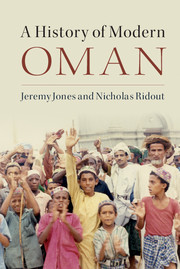Book contents
- Frontmatter
- Contents
- List of Figures
- List of Maps
- Acknowledgements
- Map
- Introduction
- Part One Foundations
- Part Two Modern History
- 4 The Sultanate as Nation, 1932–1959
- 5 Dhofar
- 6 Oil, Government and Security, 1955–1980
- 7 Shura, Diplomacy and Economic Liberalisation, 1980–2000
- 8 Oman in the Twenty-First Century
- Bibliography
- Index
4 - The Sultanate as Nation, 1932–1959
from Part Two - Modern History
Published online by Cambridge University Press: 05 September 2015
- Frontmatter
- Contents
- List of Figures
- List of Maps
- Acknowledgements
- Map
- Introduction
- Part One Foundations
- Part Two Modern History
- 4 The Sultanate as Nation, 1932–1959
- 5 Dhofar
- 6 Oil, Government and Security, 1955–1980
- 7 Shura, Diplomacy and Economic Liberalisation, 1980–2000
- 8 Oman in the Twenty-First Century
- Bibliography
- Index
Summary
Said bin Taimur had served as the President of Sultan Taimur's Council of Ministers since 1929, effectively in charge of the government during his father's prolonged absences from Muscat. When Sultan Taimur abdicated, he succeeded him, as had been planned, becoming Sultan of Muscat and Oman on February 10, 1932. In June of the same year the first oil on the Arabian side of the Gulf was found, in Bahrain. In September Abdul-Aziz ibn Saud finally succeeded in reunifying the provinces of the earlier Saudi states in the new Kingdom of Saudi Arabia. The year 1932 marks more, therefore, than the transition from one Sultan to another in Oman; it may also be seen as the moment at which a major change was inaugurated in the political and economic order of the Arabian Peninsula. As part of this broader process of change, Oman started to become, for the first time in its history, the kind of unified nation-state that has become the dominant form of political organisation in the modern world. This process of transformation owed much to external circumstances: in particular, the possibility that there might be oil to be discovered in Oman, too, led Sultan Said, the British government and the oil companies to the shared conviction that its exploitation could best be achieved within a clearly delimited territory under a single political authority. From 1932 to 1959, then, Sultan Said oversaw a complex and difficult attempt to forge a unified state, while at the same time he sought to limit the extent of its dependence upon the British, even while relying upon their political and military support to secure its unity and its independence.
Understanding Sultan Said
It used to be a commonplace of historical accounts of his reign to characterise Sultan Said as a deeply conservative and intransigent figure, entirely resistant to change and responsible for maintaining his country in a state of backwardness and isolation. Much of this reputation appears to derive from the last decade of his reign, by which time he had withdrawn to Salalah, where his minimal administration was certainly responsible for widespread economic neglect, social repression and stagnation in Dhofar.
- Type
- Chapter
- Information
- A History of Modern Oman , pp. 99 - 131Publisher: Cambridge University PressPrint publication year: 2015



